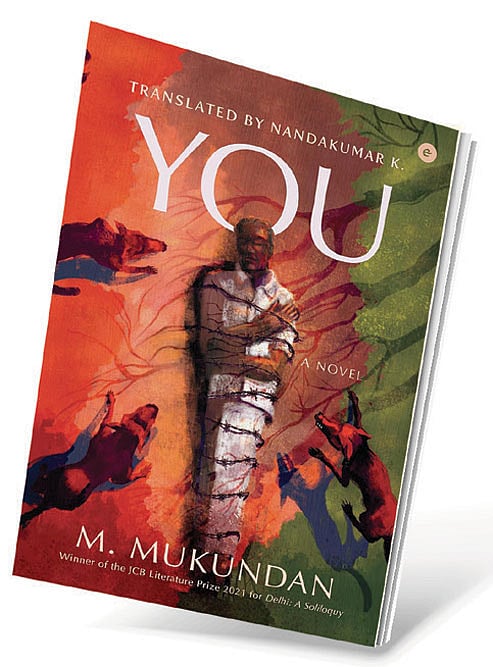Rethinking Mercy

IN YOU, READERS won’t find the characteristic magic for which the veteran Mahe-born writer M Mukundan, now 82, has won acclaim. His post-modern works—such as Mayyazhippuzhayude Theerangalil (On the Banks of the River Mayyazhi), Daivathinte Vikrithikal (God’s Mischief), and Kesavante Vilapangal (Kesavan’s Lamentations)— most of which have been translated into English, are vastly different from this latest novel. Originally published in Malayalam as Ningal in 2023, it has since been translated into English by Nandakumar K Mukundan, a former French diplomat and an award-winning novelist who has won recognition both in India and in France, doesn’t exactly disappoint—unless you are a die-hard fan averse to him experimenting with new narrative styles. In this work, he neither writes like a weary novelist recycling his former self, nor does he dazzle us with an unexpected burst of originality. Yet, the book is a compelling, easy read that draws the reader steadily into his line of thought.
At its core, You is unconventional, to say the least. The main character, Unnikrishnan, is presented as ‘you’, the reader, from which the title comes. The book opens with the line: “Your name is Unnikrishnan.” Whether or not you connect with the protagonist is left to you. Unnikrishnan returns to his native village in Kerala after three decades, having fled home during an earlier period of political unrest. Contemporary references—iPhones, the Gulf Boom— place us more or less in the present. One of his brothers, now based in Bahrain, is part of the Gulf migration story, while another has fairly succeeded in a local business.
Imran Khan: Pakistan’s Prisoner
27 Feb 2026 - Vol 04 | Issue 60
The descent and despair of Imran Khan
Unnikrishnan’s whereabouts over the past 30-plus years remain a mystery. His childhood friend Balan, now an oncologist, urges him to open up repeatedly, but to no avail. Speculation abounds: some say he was a Naxalite who vanished during the Naxalbari movement; others claim to have seen him at a pilgrimage site; still others believe he settled in Africa and prospered.
Born into a lower-middle-class family in Kerala in the second half of the 20th century, Unnikrishnan was the first graduate in his household. His dream was to be a novelist, but circumstances pushed him into working at a local cinema. He eventually realised his literary ambitions with a novel on the Malabar Rebellion. While working on a second book, he abruptly disappeared, leading many, including friends and family, to presume he was dead.
Now aged 70 and apparently in good health, Unnikrishnan soon begins to feel pain in his left leg. Medical investigations, aided by Balan, reveal a terminal illness even as Unnikrishnan puts up a brave face. Doctors give him no more than six months to live, though readers only learn this later in the story.
The novel starts with Unnikrishnan holding a dramatic press conference to announce the date of his death, clarifying that it will not be by suicide. He is disappointed that only three journalists attended because he intended to use traditional media to reach out to people, not social media. Enter Parvati (Paru), a journalism trainee whose editor demands she turn Unnikrishnan into a story—if she succeeds, she gets a permanent job; if not, she’s out.
It is here that debates around euthanasia and its legal and moral dimensions emerge as hot topics. Unnikrishnan eventually dies a mercy death, resolving the question posed at the beginning: how could he predict the exact time of his death?
Although not one of Mukundan’s finest works, You is far from dull. It may lack the lyrical richness of his earlier fiction, but it retains the ability to provoke thought and invite engagement.

